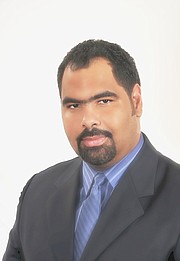By NEIL HARTNELL
Tribune Business Editor
nhartnell@tribunemedia.net
Fidelity Bank (Bahamas) yesterday said it is on course to increase full-year profits by ten percent after beating its $25m loan book growth target in just nine months.
Gowon Bowe, pictured, the BISX-listed commercial bank’s chief financial officer, told Tribune Business that a consumer credit-focused loan campaign had expanded its portfolio by $30m during the three quarters to end-September 2018.
With non-performing loans in the bank’s mortgage portfolio under control, he revealed that Fidelity Bank (Bahamas) had “already made up the stagger in the relay race” by blowing past the one-time $6.7m accounting charge it took at the start of 2018 to grow profits for the first nine months by 12.4 percent.
“I’m hoping that what I spoke to you about at the end of last year holds true in terms of having at least a ten percent increase in profits,” Mr Bowe told Tribune Business of the 2018 full-year outlook.
“In terms of loan growth we’ve already achieved that by the third quarter in terms of what we were planning, a $25m increase in gross loans. We’ve already exceeded that at $30m.”
Mr Bowe said “a large portion” of that growth came from personal/consumer loans, which are typically used to purchase vehicles, furniture and other expensive goods, with the repayment and amortisation of existing loans resulting in a net $15.15m expansion of the bank’s credit portfolio compared to year-end 2017.
The loan portfolio expansion, and 9.5 percent year-over-year interest income growth to $46.966m, drove Fidelity Bank (Bahamas) double-digit total comprehensive income increase to $18.111m for the first nine months of 2018. That represents an almost $2m increase over the prior year’s $16.118m.
“The interest income will continue to benefit from growth in the loan book that took place in the first eight months of the year,” the chief financial officer added.
Mr Bowe said the improved bottom line had been achieved despite the “day one adjustment” that required the BISX-listed institution to increase loan loss provisions by $6.7m, which resulted from a new accounting treatment that now requires such provisions to be based on “expected losses” rather than when a loan becomes non-performing.
“We’ve made up the stagger, to use the analogy of the relay race, and seen profits that make up for that day one adjustment,” he told Tribune Business. “We will be increasing the dividend shortly, in line with the prior year, and that should be a positive surprise to shareholders relative to how it stands compared to last year.”
The Fidelity Bank (Bahamas) chief financial officer said the dividend payment to investors will be made before year-end, and in time for Christmas, although he did not specify how much they will receive. The bank is 75 percent owned by its parent, Fidelity Bank & Trust International.
He emphasised that the institution was “focusing on maintaining a high quality performance loan book”, and added: “We’re not issuing loans for the sake of growth. We’re doing sustainable lending to people who have a commitment to repay their borrowings, and the means.
“That means hard decisions with respect to customers, but we’re trying to instill discipline in them that borrowing is to aid their lives, not to enslave them going forward. It’s teaching them to instill discipline in their financial habits and, while they may need borrowing to get through today, they must have savings to ensure they live in comfort before retirement and settle all bills before they reach the end of their working lives.”
Fidelity Bank (Bahamas) net interest income for the nine months to end-September rose by over $5.5m or 16.6 percent to $39.781m, aided by a $1.5m year-over-year decline in interest expense that resulted from the prevailing low rate environment.
Mr Bowe, though, said the bank was still “ensuring customers get an equitable interest rate on their deposits”. This resulted in its deposit base growing by almost $56.5m, or 20.7 percent, compared to 2018 - a rate of growth that outstripped the loan portfolio’s expansion.
The deposit base expansion, in turn, has increased Fidelity Bank (Bahamas) cash holding by almost $40m to $143.084m year-over-year, as the bank - in common with its competitors - struggles to find qualified mortgage borrowers to lend to.
“We are looking at strategies to deploy that cash,” Mr Bowe told Tribune Business, “and laying off some of that cash and managing liquidity. That growth in customer deposits has allowed us to manage our wholesale funding and take out some debt securities.”
He explained that Fidelity Bank (Bahamas) had already redeemed around $10m of its $50m in outstanding bonds, reducing these liabilities from $43.933m to $34.67m at end-September 2018.
This, Mr Bowe explained, had enabled it to reduce its funding costs by replacing bonds with a 6 percent interest rate with lower-priced customer deposits.
“We’ve taken out more costly bonds and replaced them with cheaper customer deposits,” he told Tribune Business. “We’ve been able to use the deposit base to fund the bank as opposed to wholesale funding, and maintain flexibility with wholesale funding.”
Mr Bowe said Fidelity Bank (Bahamas) would be looking for “a prosperous” 2019 and “similar type growth”, although he declined to specify how much. He added that staffing and resources had been expanded in line with the bank’s growth and that of its loan book, resulting in the more than $1m jump in staff salaries and benefits year-over-year.





Comments
Use the comment form below to begin a discussion about this content.
Sign in to comment
OpenID